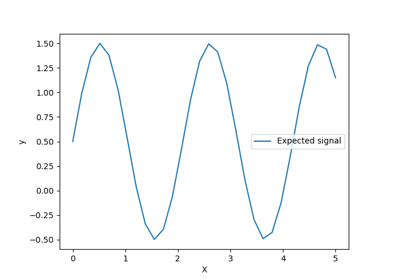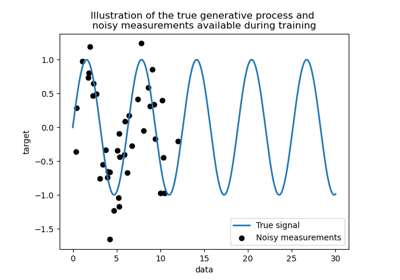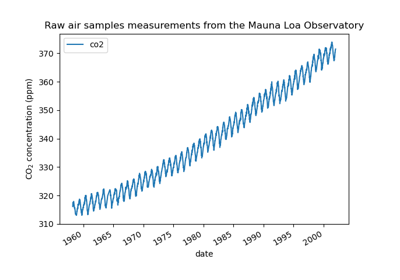sklearn.gaussian_process.kernels.WhiteKernel¶
- class sklearn.gaussian_process.kernels.WhiteKernel(noise_level=1.0, noise_level_bounds=(1e-05, 100000.0))[source]¶
White kernel.
The main use-case of this kernel is as part of a sum-kernel where it explains the noise of the signal as independently and identically normally-distributed. The parameter noise_level equals the variance of this noise.
\[k(x_1, x_2) = noise\_level \text{ if } x_i == x_j \text{ else } 0\]Read more in the User Guide.
New in version 0.18.
- Parameters:
- noise_levelfloat, default=1.0
Parameter controlling the noise level (variance)
- noise_level_boundspair of floats >= 0 or “fixed”, default=(1e-5, 1e5)
The lower and upper bound on ‘noise_level’. If set to “fixed”, ‘noise_level’ cannot be changed during hyperparameter tuning.
- Attributes:
boundsReturns the log-transformed bounds on the theta.
- hyperparameter_noise_level
hyperparametersReturns a list of all hyperparameter specifications.
n_dimsReturns the number of non-fixed hyperparameters of the kernel.
requires_vector_inputWhether the kernel works only on fixed-length feature vectors.
thetaReturns the (flattened, log-transformed) non-fixed hyperparameters.
Examples
>>> from sklearn.datasets import make_friedman2 >>> from sklearn.gaussian_process import GaussianProcessRegressor >>> from sklearn.gaussian_process.kernels import DotProduct, WhiteKernel >>> X, y = make_friedman2(n_samples=500, noise=0, random_state=0) >>> kernel = DotProduct() + WhiteKernel(noise_level=0.5) >>> gpr = GaussianProcessRegressor(kernel=kernel, ... random_state=0).fit(X, y) >>> gpr.score(X, y) 0.3680... >>> gpr.predict(X[:2,:], return_std=True) (array([653.0..., 592.1... ]), array([316.6..., 316.6...]))
Methods
__call__(X[, Y, eval_gradient])Return the kernel k(X, Y) and optionally its gradient.
clone_with_theta(theta)Returns a clone of self with given hyperparameters theta.
diag(X)Returns the diagonal of the kernel k(X, X).
get_params([deep])Get parameters of this kernel.
Returns whether the kernel is stationary.
set_params(**params)Set the parameters of this kernel.
- __call__(X, Y=None, eval_gradient=False)[source]¶
Return the kernel k(X, Y) and optionally its gradient.
- Parameters:
- Xarray-like of shape (n_samples_X, n_features) or list of object
Left argument of the returned kernel k(X, Y)
- Yarray-like of shape (n_samples_X, n_features) or list of object, default=None
Right argument of the returned kernel k(X, Y). If None, k(X, X) is evaluated instead.
- eval_gradientbool, default=False
Determines whether the gradient with respect to the log of the kernel hyperparameter is computed. Only supported when Y is None.
- Returns:
- Kndarray of shape (n_samples_X, n_samples_Y)
Kernel k(X, Y)
- K_gradientndarray of shape (n_samples_X, n_samples_X, n_dims), optional
The gradient of the kernel k(X, X) with respect to the log of the hyperparameter of the kernel. Only returned when eval_gradient is True.
- property bounds¶
Returns the log-transformed bounds on the theta.
- Returns:
- boundsndarray of shape (n_dims, 2)
The log-transformed bounds on the kernel’s hyperparameters theta
- clone_with_theta(theta)[source]¶
Returns a clone of self with given hyperparameters theta.
- Parameters:
- thetandarray of shape (n_dims,)
The hyperparameters
- diag(X)[source]¶
Returns the diagonal of the kernel k(X, X).
The result of this method is identical to np.diag(self(X)); however, it can be evaluated more efficiently since only the diagonal is evaluated.
- Parameters:
- Xarray-like of shape (n_samples_X, n_features) or list of object
Argument to the kernel.
- Returns:
- K_diagndarray of shape (n_samples_X,)
Diagonal of kernel k(X, X)
- get_params(deep=True)[source]¶
Get parameters of this kernel.
- Parameters:
- deepbool, default=True
If True, will return the parameters for this estimator and contained subobjects that are estimators.
- Returns:
- paramsdict
Parameter names mapped to their values.
- property hyperparameters¶
Returns a list of all hyperparameter specifications.
- property n_dims¶
Returns the number of non-fixed hyperparameters of the kernel.
- property requires_vector_input¶
Whether the kernel works only on fixed-length feature vectors.
- set_params(**params)[source]¶
Set the parameters of this kernel.
The method works on simple kernels as well as on nested kernels. The latter have parameters of the form
<component>__<parameter>so that it’s possible to update each component of a nested object.- Returns:
- self
- property theta¶
Returns the (flattened, log-transformed) non-fixed hyperparameters.
Note that theta are typically the log-transformed values of the kernel’s hyperparameters as this representation of the search space is more amenable for hyperparameter search, as hyperparameters like length-scales naturally live on a log-scale.
- Returns:
- thetandarray of shape (n_dims,)
The non-fixed, log-transformed hyperparameters of the kernel
Examples using sklearn.gaussian_process.kernels.WhiteKernel¶

Ability of Gaussian process regression (GPR) to estimate data noise-level

Comparison of kernel ridge and Gaussian process regression

Forecasting of CO2 level on Mona Loa dataset using Gaussian process regression (GPR)